Archive for the ‘DIFF’ Category
Listen and Appreciate
Fallen Leaves
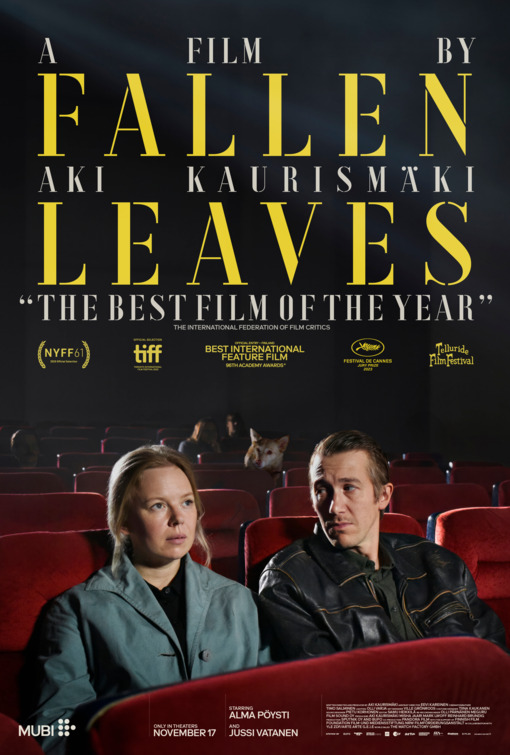
Director: Aki Kaurismaki
Cast: Alma Poysti, Jussi Vatanen, Janne Hyytiainen
Running Time: 1 hour 21 minutes
Film Rating: 7.5 out of 10
Language: Finnish with English subtitles
Festival: Durban International Film Festival
Finnish director Aki Kaurismaki presents his deadpan humour cinematically in the wonderful wacky romantic comedy Fallen Leaves starring Alma Poysti as Ansa Gronholm, a shelf stocker at a local supermarket in Helsinki and welder and Jussi Vatanem as construction worker Holappa who has a periodic drinking problem.
Despite the dreary lives of the two main characters, their courtship and blighted romance takes on an absurdist tinge as Fallen Leaves resembles more a Pedro Almodovar film with its characters dressed in primary colours, its scenes of bizarre Finnish nightlife involving bad Karaoke, where the characters are told to listen and appreciate. It’s as if Almodovar made a film set in Helsinki and not Madrid.
Fallen Leaves is filled with some hilarious scenes especially when Ansa received her electricity bill and cannot afford to pay it as she has been retrenched so she unplugs all the appliances. Then there are the karaoke scenes in which Holappa flirts with Ansa only later to ask her on a date at a dodgy looking art cinema named the Ritz, which culminates in him losing her phone number.
Ansa decides that men are completely unreliable and after she finds another low level job as a construction worker, she adopts a dog to keep her company. Holappa on the other hand jumps from job to job as he frequently takes to vodka to drown his sorrows and his miserable life. His only companionship is his fast talking older friend Hannes Huotari played by Janne Hyytiainen, who hits on younger woman only to be told he is too old for them even though he hasn’t hit 50.
Fallen leaves is a delightful 81 minutes, a brief snapshot into life in contemporary Helsinki in which most of the sparse dialogue is interrupted by radio reports of the ongoing Russian invasion of the Ukraine, which director Aki Kaurismaki snuck in there to provide a subliminal political commentary.
Crisply acted by Alma Poysti and Jussi Vatanem, Fallen Leaves beautifully charts a young couples event ridden courtship to their final walk into the sunset, while subtly highlighting issues of social connection, isolation, worker exploitation and addiction.
Colourful and deadpan with a distinctly Scandinavian sense of humour Fallen Leaves gets a film rating of 7.5 out of 10 and is highly recommended as a quirky love story about fate, films and falling in love.
If viewers love an art house romance, then catch Fallen Leaves on a streaming site. This Finnish film was a beautiful way to end of the 45th Durban International Film Festival.
Broken Characters
Memory

Director: Michel Franco
Cast: Jessica Chastain, Peter Sarsgaard, Merritt Weaver, Josh Charles, Jackson Dorfman, Jessica Harper, Brooke Timber
Running time: 1 hour 43 minutes
Film Rating: 6.5 out of 10
Festival: Durban International Film Festival
Mexican director Michel Franco assembles an American cast in his latest film Memory starring Oscar winner Jessica Chastain (The Eyes of Tammy Faye) and Peter Sarsgaard (The Lost Daughter, Blue Jasmine). The two American stars play dysfunctional and broken characters in this contemporary New York drama.
Jessica Chastain plays Sylvia, a single mother and recovering alcoholic who is grappling with her traumatic past. Sylvia is very strict with her teenage daughter Anna played by Brooke Timber not allowing her to mix with boys or to go to teenage parties hoping to prevent a repetition of her own traumatic youth. Sylvia is supported emotionally by her stable and reliable younger sister Olivia wonderfully played Merritt Weaver (Marriage Story, Birdman and Michael Clayton) who is married with three children. Anna spends most of her time with her cousins while Sylvia is trying to cope with everyday life.
Anna’s life changes forever when a strange man Saul follows her home from a party then falls asleep on her doorstep outside her rundown apartment next to a tyre dealership in New York.
Peter Sarsgaard is brilliant as Saul Shapiro, the strange man who suffers from dementia and is looked after by his younger brother Isaac played by Josh Charles. Sarsgaard won the Best Actor prize at the 2023 Venice Film Festival for playing Saul who is constantly confused yet knows that in Sylvia he finds the love of his life, a woman equally damaged as he is, but who is able to look after him and incorporate him into the family dynamic involving her and her daughter.
At a family gathering, all of Sylvia’s traumatic past gets laid bare in a crucial scene in which she brings Saul to meet her sister Olivia, while the sisters overbearing mother Samantha played by Jessica Harper confronts Sylvia about her life choices.
While the acting of the two main lead stars is impeccable, Memory as a film falters as the storyline lacks pace and at times feels like a tortured unglamorous saga in which New York as a city is not even featured except as a grimy backdrop for miserable characters.
Director Michel Franco aims for an art house film whose storyline doesn’t really go anywhere except to highlight themes like addiction, complex family relationships and mental health.
Memory is worth seeing for Jessica Chastain and Peter Sarsgaard’s performances but unfortunately the storyline fails the characters. Memory gets a film rating of 6.5 out of 10. Catch Memory in cinemas or on an available streaming site.
The Court Jester’s Power
The Showerhead
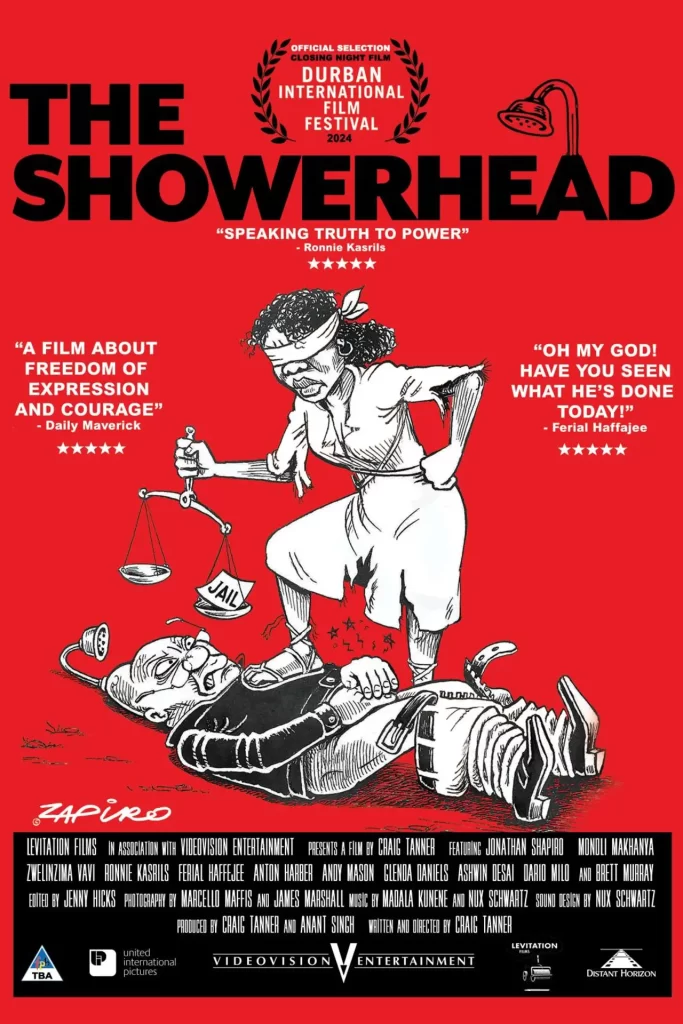
Director: Craig Tanner
Running time: 99 minutes
Film Rating: 8 out of 10
Film Festival: Durban International Film Festival
Please note this film is a Documentary
Thank you to Videovision Entertainment for the invitation to the preview media screening held at their offices in Umhlanga on Wednesday 24th July 2024.
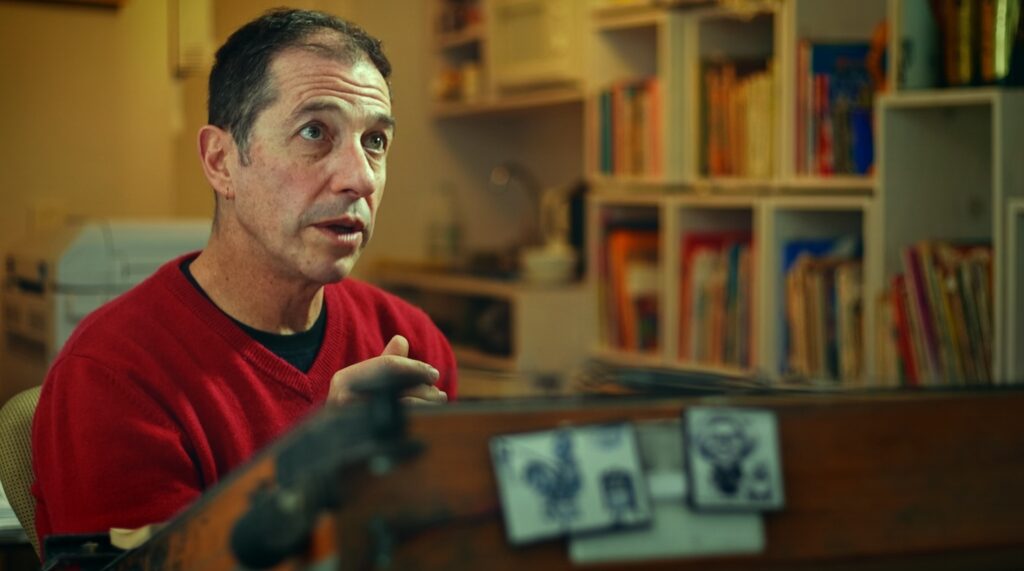
The role of the court jester in any royal court is to make the king laugh by poking fun at the king and his antics.
In documentary filmmaker Craig Tanner’s film The Showerhead, Zapiro, that famous and incisive political cartoonist whose cartoons on many South African politicians have graced the pages of the Sunday Times, Mail and Guardian and more recently The Daily Maverick, is the court jester and he holds all the power.
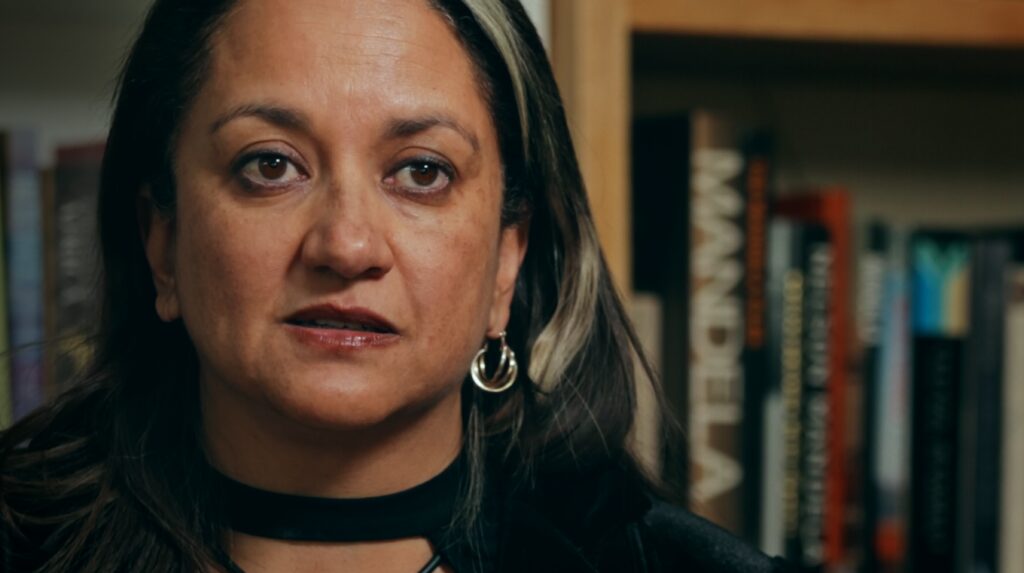
The Showerhead is one of the best documentaries on the freedom of expression particularly pertinent to the South African political landscape which has now shifted from the disastrous Zuma years through state capture to Ramaphosa’s second term of office in which the President guides the beast that is the Government of National Unity following the ANC’s loss of their majority in the recent 2024 elections.
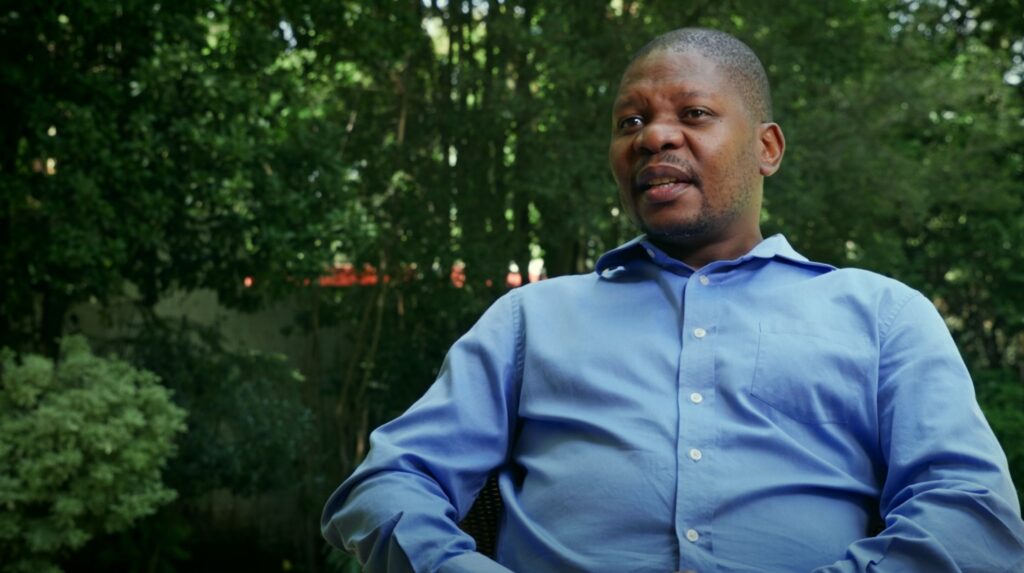
Viewing The Showerhead through an amused vantage point of 2024, where the political landscape has transformed considerably, this excellent documentary focuses on the life of Zapiro, known as Jonathan Shapiro whose extraordinary ability to capture in cartoons the South African political zeitgeist of the moment, focussing particularly of his numerous depictions of former President Jacob Zuma from his rise to power to his rape trial and then of course to his numerous corruption charges which ultimately lead to his downfall.
In a recent online interview with director Craig Tanner and Zapiro, I asked them about their collaboration process, which they replied was intense but rewarding as Tanner expertly weaves the life of Jonathan Shapiro as he emerges as the leading controversial political cartoonist in South Africa as the politics of the country swept from President Thabo Mbeki’s AIDS denialism in the early 2000’s to the rise of President Zuma in 2009.
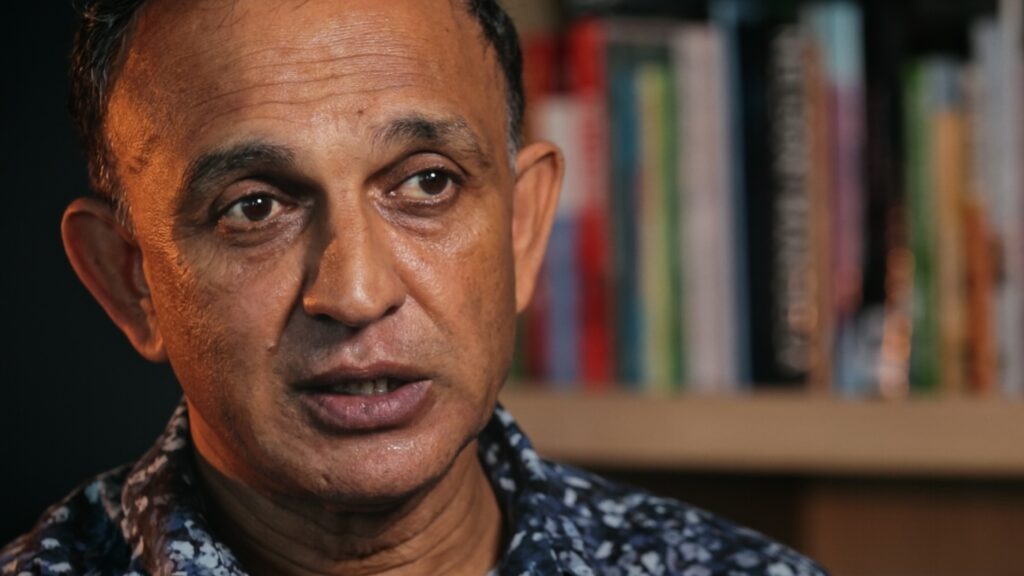
Zapiro expertly captured all of Zuma’s disgraceful antics from his rape trial to his shady association with the Gupta brothers at the height of State Capture which wrecked the South African economy, to President Zuma suing Zapiro for a particularly blistering cartoon of the rape of Lady Justice.
Ultimately, The Showerhead is about the right to freedom of expression and how powerful politicians should not interfere with that right. It must be expressed by talented cartoonists like Zapiro or brilliant contemporary artists like Brett Murray whose controversial painting of Jacob Zuma known as The Spear which appeared at the Goodman Gallery in Johannesburg caused a clash between the artists right to exhibit and the government’s power to censor.
The Showerhead is specifically South African, but it will find an audience internationally as freedom of expression is being undermined in many repressive countries globally.
Craig Tanner’s excellent and humorous document will not only take the viewers on a forgotten political journey of previous SA presidents but focuses on the talented Zapiro who captures every politician’s misstep with spot on humour and ingenuity.
The Showerhead closes the 45th Durban International Film Festival tonight Saturday 27th July 2024 and will sure have audiences talking beyond it’s premiere and into its commercial release which is being facilitated by Videovision Entertainment.
In the case between Zapiro and Zuma, the court jester has all the power as he successfully outwits a fallen king.
The Showerhead gets a film rating of 8 out of 10 and is highly recommended viewing as an extraordinary documentary and a brave account of significance of the freedom of expression, which is enshrined in the South African constitution. Catch The Showerhead on commercial cinema release later this year, its brilliant.
Irreproachable
The Seed of the Sacred Fig
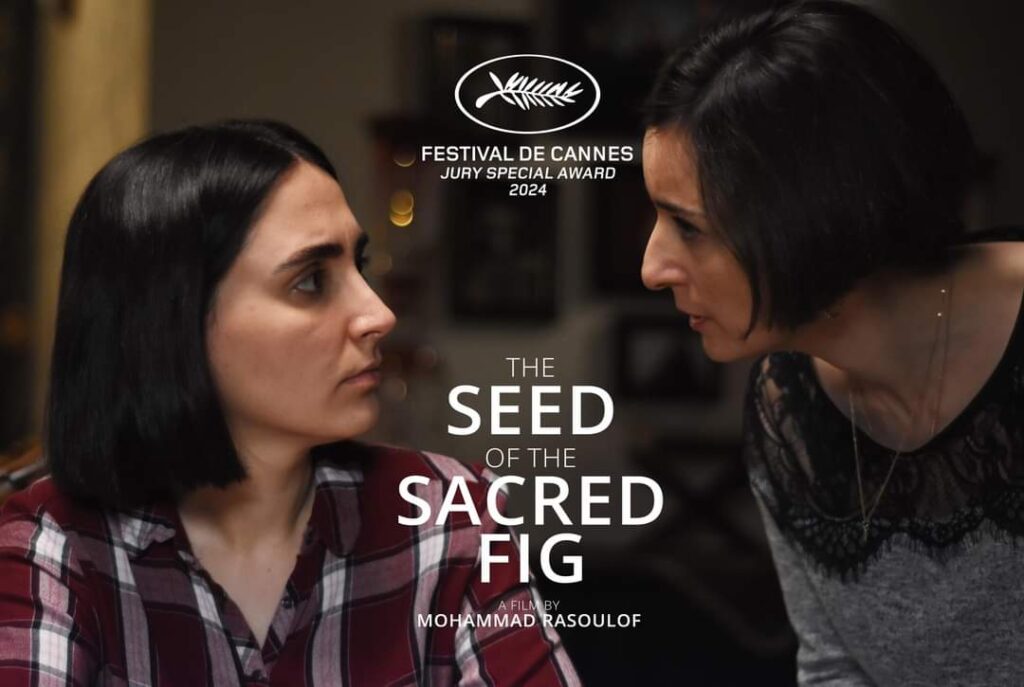
Director: Mohammad Rasoulof
Cast: Mahsa Roshani, Setareh Maleki, Niousha Akhshi, Missagh Zareh, Soheila Golestrani
Running Time: 2 hours and 48 minutes
Film Rating: 8 out of 10
Film Festival: Durban International Film Festival – DIFF
Language: Persian with English subtitles
After a tumultuous start to the premiere of Iranian director’s new film The Seed of the Sacred Fig which eventually did premiere in competition at the 2024 Cannes festival, the lucky director Mohammad Rasoulof managed to escape his sentence in Iran of 8 years in prison, a whipping and a fine and move to Germany in May 2024 just in time for his superb yet complex film to premiere at Cannes Film Festival in France.
Fresh from its controversial premiere, The Seed of the Sacred Fig had its African premiere at the 45th Durban International Film Festival and is a fascinating yet complex, slightly drawn out family drama which moves from the confines of a luxury apartment in central Tehran to an outlying area of Iran: a remote house in the countryside.
Much like director Justine Triet’s Oscar winning courtroom drama Anatomy of a Fall, which rightly won best original screenplay at the 2024 Oscars, The Seed of the Sacred Fig which was also written and directed by Mohammad Rasoulof is a simple story about a family of four: a father, a mother and two daughters.
One day the father who has been promoted as an investigator whose job description is shady at best, comes home one day and brings a gun to the apartment. He shows it to his wife. Then the gun goes missing.
Ironically, before this incident, the father tells his family that their actions should be viewed by the rest of Iranian society as irreproachable. After all he is an investigating judge for the Islamic Revolutionary Court in Tehran.
While the investigator Iman played by Missagh Zareh is often absent, his wife Rezvan played brilliantly by Mahsa Rostami has to contend with their two young daughters Sana and Sadaf as they start rebelling against the current government and as protests flare up in central Tehran many horrific videos are shared on social media and soon the eldest Sadaf assists one of her college friends who gets badly beaten.
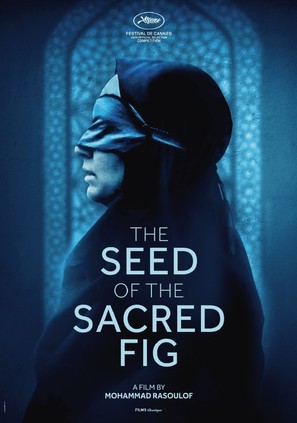
The women have no rights in this film and interestingly when Iman’s gun goes missing which could threaten his job in the pernicious administration, his work colleague suggests that he interrogates his wife and two daughters.
From domestic harmony, where the social unrest and strife is always viewed through partly closed windows as the night sky in Tehran is lit up with fires and the sounds of civil unrest, that external social strife soon becomes internalized in this family when Iman takes his wife and daughters to a remote location to question them, the only time that a seemingly normal family event occurs which rapidly deteriorates into a cat and mouse game between captor and hostage.
As Iman’s true occupation as a judge and executioner gets revealed, director Mohammad Rasoulof expertly directs the action by incorporating real footage from social media of recent civil unrest in Tehran, while commenting on the many contradictions in Iranian society as it struggles to maintain traditions and religious custom while digital advancement gradually undermines the social fabric.
Ominous in tone, but hugely fascinating as a piece of cinema which offers an unfiltered glimpse into a reclusive society which is completely at odds with the West, The Seed of the Sacred Fig gets a solid rating of 8 out of 10.
The only criticism is that some of the domestic scenes could have been edited, otherwise this complex family film is recommended viewing as a fine example of International cinema.
Savitha’s Choice
A Match
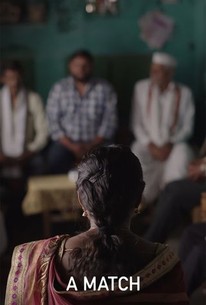
Director: Jayant Diganbar Somalkar
Cast: Nandini Chikte, Sandip Somalkar, Taranath Khiratkar, Sangita Sonekar, Suyog Dhawas
Running time: 1 hour 44 minutes
Film Rating: 7.5 out of 10
Film Festival: Durban International Film Festival – DIFF – https://ccadiff.ukzn.ac.za/
Strip away all the Bollywood dazzle and audiences are left to contemplate director Jayant Diganbar Somalkar authentic Indian directorial debut film A Match focusing on the future of a young Indian woman Savita who lives in the countryside with her father, a cotton farmer, her mother and her misbehaving brother Mangya played by Suyog Dhavas.
Savita is adeptly played by a non-professional actor Nandini Chikte who plays the role of perpetual candidate for an arranged marriage as endless groups of men, male relatives of a potential suitor interview her about her age, her caste, her education and her hobbies. This is all part of the traditional practices of setting up an arranged marriage in rural India.
Savitha has other plans which involves her completing her education and writing her final exam on sociology while flirting with her male lecturer as they read the newspapers.
As the Indian trains run swiftly past rural villages, A Match follows the journey of Savitha and more significantly her hapless father Daulatrao played by Taranath Khiratkar an indebted cotton farmer who is battling to survive financially and cannot wait to marry his daughter off. When one such bid for marriage represents itself as enticing the price paid to the male relatives for the potential suitor proves to be exorbitant and Daulatrao considers drastic action.
Ironically Savitha’s flirty male lecturer who preaches female emancipation in India doesn’t practice it and our heroine in this story feels constantly stifled by the overpowering and persuasive patriarchal system which allows arranged marriages to thrive often without consent from the woman involved.
Unlike the flamboyant but excellent 2001 Mira Nair film Monsoon Wedding, director Jayant Diganbar Somalkar’s film is a grassroots and gritty exploration of arranged marriages in a traditional rural Indian village far away from the glossy, bustling cities of Mumbai and New Delhi. The characters are authentic and identifiable, a family seemingly trapped by their own circumstances with Savitha’s ultimate choice is really to defy these restrictive social conventions.
After a successful premiere at the 2023 Toronto International Film Festival (TIFF) and now premiering at the Durban International Film Festival (DIFF) catch A Match at the 2024 festival or on a future streaming site.
A fascinating portrayal of arranged marriages and generational conflict, A Match gets a film rating of 7.5 out of 10 and is worth seeing especially as the cast comprises non-actors. Recommended viewing.
The Blame Frame
All the Beauty and the Bloodshed
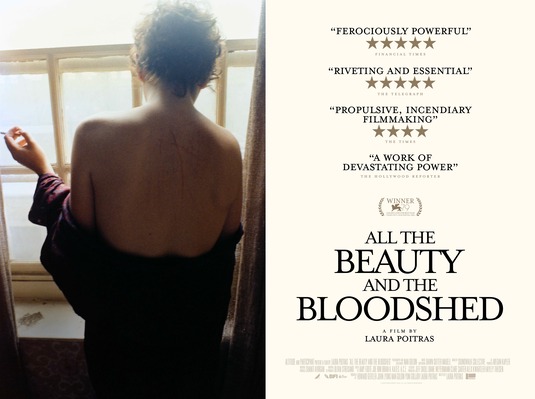
Director: Laura Poitras
Running Time: 2 hours and 2 minutes
Festival: Durban International Film Festival (DIFF2023)
PLEASE NOTE THAT THIS FILM IS A DOCUMENTARY FEATURE
Even before viewers watch film maker Laura Poitras Oscar nominated documentary All the Beauty and the Bloodshed, they should read the New Yorker journalist’s superbly researched book Empire of Pain: The Secret History of the Sackler Dynasty by Patrick Radden Keefe who gives a detailed account of the complex issues surrounding the extensive opioid crisis that gripped America for the first 20 years of the 21st century.
Poitras chooses to follow the bohemian life of photographer and activist Nan Goldin who herself got addicted to OxyContin and then once recovered launched a successful smear campaign again the Sackler Family who owned the Pharmaceutical giant Purdue Pharma who made and distributed the highly addictive strong pain killer OxyContin, which is a derivative of heroin.
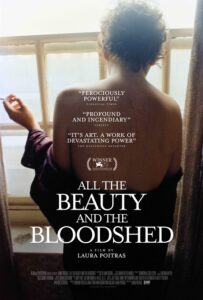
All the Beauty and the Bloodshed focuses on Goldin’s smear campaign, who as an artist who had her work hung in some of the world’s most prestigious galleries from The Met to the Guggenheim and the Louvre, attacked the immensely wealthy Sackler’s families philanthropic efforts of donating huge amounts of money to galleries in New York, London and Paris with the proviso that the cultural institution name a wing of the gallery after the Sackler’s.
With a brilliant title, All the Beauty and the Bloodshed, documentarian Laura Poitras makes her position clear that she is on the side of Nan Goldin and does not maintain an objective gaze but instead scandalizes the actual smear campaign which was both riveting and explosive as Nan Goldin and her gang of activists stages protests in the Guggenheim throwing thousands of prescription OxyContin bottles down the spiral ramp of the Guggenheim, the most glamourous art gallery in New York. Goldin does a similar protest at the Louvre where the European wing of the Sackler’s who were based in London had donated large amounts of money.
Laura Poitras does do a full comprehensive historical biography of Nan Goldin from her counterculture days as an emerging photographer in New York surrounded by fringe film makers and queer artists to her own addiction struggles and to the scourge of the AIDS crisis in the late 1980’s which nearly wiped out that entire counter-culture community.
Ultimately what Poitras does do is paint the immensely clever and secretive Sackler clan as aloof billionaires who had invented a drug which was abused by millions of Americans and many died, while not accepting any responsibility for how they had contributed to the Opioid epidemic from 2000 to 2020, while vastly benefiting from the immense profits made by their Pharmaceutical company.
The faces of Kathe and Richard Sackler, some of the heirs of the vast wealth of the Sackler clan, as appearing cold and unsympathetic at the end of the documentary when the family is deposed virtually in 2020 to appear before the families of the victims who died during this crisis, paints the family that privately owned Purdue Pharma as completely unsympathetic, which they were. The Sackler’s did not acknowledge guilt or accountability but through the efforts of Nan Goldin and her gang of protesters, years of philanthropy have been stripped at some of the finest cultural institutions in the world as the Sackler name was erased from the esteemed Art World.
As a documentary film maker, Laura Poitras does a superb job of bringing the opioid crisis to light and how the once influential Sackler family lost their reputation but not their wealth. All The Beauty and the Bloodshed is a fascinating if slightly one sided documentary which is tangential in parts but illuminating in other.
While the complex ethics of pharmaceutical distribution is largely untouched in this documentary, the focus squarely remains on the Sackler’s enormous contribution to the World of Art and their untimely undoing by a spiralling opioid crisis and Federal litigation. See this documentary in conjunction with reading Patrick Radden Keefe’s brilliant non-fiction book, to gain the full complex history of the Sackler family and the opioid crisis in America.
All the Beauty and the Bloodshed gets a film rating of 8 out of 10 and is a fascinating tale of counterculture flamboyance and protest versus corporate greed and murky philanthropy to some of the most influential art galleries in the World: The Louvre, the Guggenheim, The Tate and the Met. Highly recommended viewing.
Escaping the Community
Banel & Adama

Director: Ramata-Toulaye Sy
Cast: Khady Mane, Mamadou Diallo, Binta Racine, Moussa Sow
Running time: 87 minutes
Film Rating: 6.5 out of 10
Festival: Durban International Film Festival (DIFF)
Language: Sengalese with English Subtitles
After having its world premiere at the 76th Festival de Cannes, Sengalese director Ramata-Toulaye Sy ‘s thought provoking film Banel and Adama was chosen as the closing film of the 44th Durban International Film Festival in July 2023.
Banel and Adama won the Bright Horizon award at the Melbourne International Film Festival and is an incisive look at woman Adama who is supposedly trapped in a patriarchal and remote village in Northern Senegal.

Adama’s future is mapped out for her by the village elders as she is to wed the younger brother of her late husband as per tradition. However, Banel played by Mamadou Diallo is not happy with her projected future and struggles to adapt to an already mapped out life. As a young woman she struggles to take heed of advice by the village elders even when the village itself is ravaged by drought and lack of rain.
Banel is to inherit the title as village elder and along with all the men, he has to tend to the dwindling livestock in ever worsening conditions with inadequate agricultural means and a meagre population which is teetering on the edge of hunger.
Unlike Western cinema which always focuses on the interplay between hero and villain, director Rama-Toulaye Sy paints a vivid cinematic portrait of a community struggling to survive against nature and of a woman fighting to establish her own self-identity in an environment which is prescribed by traditional Muslim values and a superstition of all things individual.

Banel and Adama is a fascinatingly authentic African film, a lens which is rare for cinema going audiences from a country which has virtually no visibility on the world stage.
Interwoven with some beautifully stark images, Banel and Adama is a symbolic tale of how an individual woman fights against the expectations of her community and a man who has to bow down to local pressure to take up the position of village leader as inherited according to dictated custom.
Debut director Rama-Toulaye Sy imbues her first film with all the traits of traditional African cinema, minimal sets and a stark production design, while skilfully keeping her narrative community driven as her two main characters battle to accept the fates that have been chosen for them by the village elders.
Tigers Don’t Get Bail
Munnel
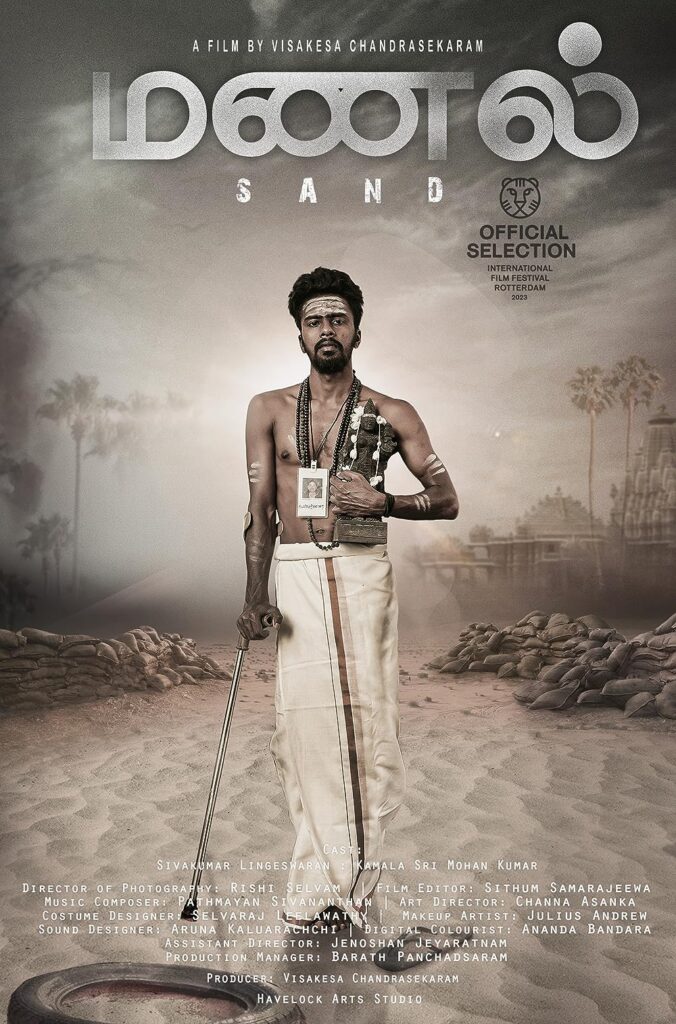
Director: Visakesa Chandrasekaram
Cast: Sivakumar Lingeswaran, Kamalasiri Mohan Kumar, Thurkka Magendran
Running Time: 100 minutes
Languages: Tamil with English Subtitles
Festival: Durban International Film Festival (DIFF)
Sri Lankan director Visakesa Chandrasekaram film Munnel had its international premiere at the International Film Festival Rotterdam earlier in 2023 and revolves around a Tamil militant Rudran played by Sivakumar Lingeswaran who returns home injured and is cared for by his strong willed old fashioned mother while searching for his missing girlfriend Vaani played by Thurkka Magendran.
Munnel is set away from the bustling metropolis of Colombo and is filmed in a very rural part of Sri Lanka whereby Rudran and his mother are living in almost poverty stricken conditions as they are fiercely protective of their own lives despite dreams of smarter things. Rudran played with a sort of stubborn arrogance by Sivakumar Lingeswaran is keen on buying a Samsung phone but he cannot afford it and he tells his mother of the wonders of new technology including Facebook and Instagram. Colombo is glimpsed at in flashbacks like an elusive city which excludes the indigent.
While Rudran is hanging out with the local village guys there is a court case brewing about his involvement as a militant in the infamous group the Tamil Tigers. Rudran was arrested for committing atrocities and crimes during the nearly four decade long Sri Lankan civil war from 1983 to 2009.
Munnel or the English translation Sand is a fascinating tale of a mother and a son whose innocence or guilt is never fully established right up until the end of the film. As the director wraps Munnel in traditional Tamil rituals and also highlights the sense of community in which the mother and son dwell even if there lingers suspicion amongst the villagers that Rudran could be guilty.
To a non-Western audience, there will be many cultural references which will be missed while watching Munnel, nevertheless it is a fascinating Sri Lankan film about the horrors of civil war and the focus on a militant that comes home only to be haunted by his past deeds. Incidentally Munnel was shot in 2019 amidst rolling blackouts, fuel shortages and a cost of living crisis in Sri Lanka.
After its world premiere at the International Film Festival Rotterdam, Munnel was a welcome addition to the films screened at the 44th Durban International Film Festival in July 2023.
As a fascinating mostly rural set Sri Lankan film, Munnel gets a film rating of 6.5 out of 10 and is slow moving in parts but is worth seeing even if it is to catch a glimpse of an exotic country in which there exists very little external media coverage.
Worth seeing but many of the traditional religious scenes will be lost on Western audiences if they are not familiar with Tamil customs and rituals.
The Ice Cream Seller and the Writer
Afire
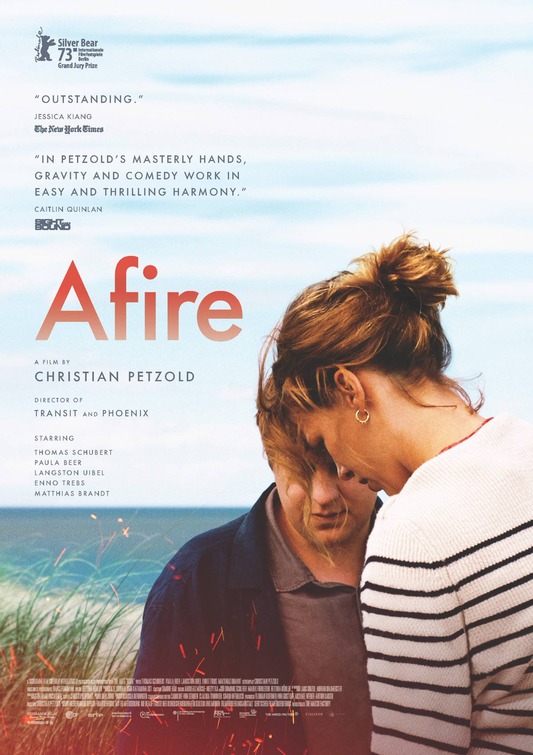
Director: Christian Petzold
Cast: Thomas Schubert (Austrian), Paula Beer, Eno Trebs (The White Ribbon dir Michael Hanneke), Langston Ubel, Matthias Brandt
Running Time: 1 hour 42 minutes
Film Rating: 8 out of 10
Language: German with English Subtitles.
Please note that this film has not had a commercial cinema release yet.
Acclaimed German film maker Christian Petzold returns with his new film Afire focusing discreetly on the wildfires that ravage Europe in the summer, wreaking havoc on remote holiday destinations. Petzold’s film Afire which premiered at the prestigious Berlinale, the 73rd Berlin International Film Festival, in February 2023 had its exclusive South African premiere hosted by the German consulate in South Africa at the Durban International Film Festival https://ccadiff.ukzn.ac.za/ on Sunday 23rd July 2023 at Suncoast Cinemas and I was privileged to attend.
Afire contains only four main characters: tortured self-absorbed writer Leon superbly played by Austrian actor Thomas Schubert who was in attendance at the film premiere; the beautiful yet elusive Nadja wonderfully played with flirty desire by German actress Paula Beer; muscular lifeguard or swimming assistant Devid played by the gorgeous Enno Trebs who as a child actor appeared in director Michael Haneke’s brilliant Oscar nominated film The White Ribbon (2010) and lastly Felix played by Langston Ubel.
With the main location being a beach house near the Baltic Sea, initially Leon and Felix hire the beach house to get some work done during the summer. Much to the boy’s surprise is the appearance of the gorgeous Nadja who is mysterious at first until they soon discover more about her.
Then the athletic and buff Devid appears on the scene, initially presumed to be Nadja’s boyfriend but as Leon discovers that assumption is way off the mark.
The narrative that follows is a tragic comedy about four young adults struggling with their own artistic personalities and their limitations while their surroundings are slowly getting ravaged to the ground by extremely dangerous wildfires.
Director Christian Petzold holds the action tight and keeps the plot mainly between these four characters as they laugh, drink wine, sulk and go for swims. All of them except Leon brilliantly played by Thomas Schubert as a thoroughly dislikeable, self-absorbed and generally painful writer who is struggling to complete a novel which he knows is terrible.
Events take a deadly turn when Leon’s editor Helmut turns up for dinner one summer evening. The intellectually arrogant Helmut played by Matthias Brandt takes a shine to the gorgeous Nadja who flits around all these men riding a bicycle in a red dress, which becomes a motif for flaming hot desire and impending danger.
Afire is completely un-American and decidedly European in every respect. A contemporary tale about modern relations, complete with fluctuating sexualities, an existential threat of climate change which becomes real and a darkly tragic turn of events that inspired the writer to craft a more competent narrative around his fascination with the ice cream seller and the lovers that turn to ash.
Afire is a brilliant film, expertly crafted with effortless acting by all the four main stars. It is highly recommended viewing for those that enjoy premium European cinema content.
Afire gets a film rating of 8 out of 10 and catch it at a cinema when it comes on general release.
The Symbol of Love
Eiffel
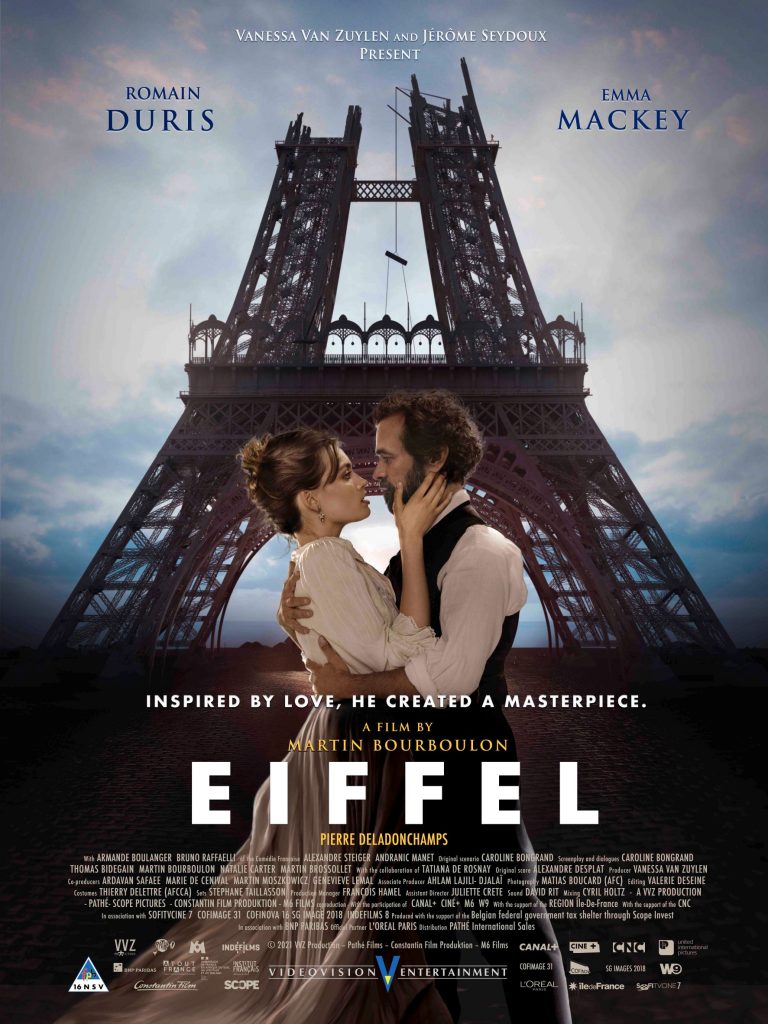
Director: Martin Bourboulon
Cast: Romain Duris, Emma Mackey, Pierre Deladonchamps, Armande Boulanger, Bruno Raffaelli
Film Rating: 8 out of 10
Running Time: 1 hour 48 minutes
This film is in French with English Subtitles
French director Martin Bourboulon’s meticulous reconstruction of the events both historical and romantic leading up to the design and construction of the infamous Paris landmark the Eiffel tower is beautifully told in a new film Eiffel which had it’s South African premiere at the Durban International Film Festival in July 2022 before going on general release in cinemas. With financial backing from Loreal Paris and BNP Paribas, Eiffel is a truly sumptuous French film.
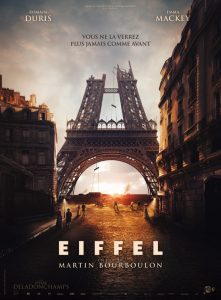
Eiffel is like watching a Merchant Ivory film in French and stars Romain Duris (All the Money in the World) as Gustave Eiffel who inadvertently reconnects with his lover from 20 years ago, the gorgeous Adrienne Bourges played by Anglo-French actress Emma Mackey who last appeared in Death on the Nile.
The only problem is that in 1886, three years before the Paris World Fair in March 1889, when the idea for the Eiffel tower is first proposed, Adrienne is unhappily married to Antoine de Rustac played by Pierre Deladonchamps.
Based upon an original screenplay by Caroline Bongrand, the plot of Eiffel skilfully weaves between two time periods, the Paris of 1886 and Bordeaux of 1860 when Gustave Eiffel having successfully designed and been an engineer on a new bridge first meets Adrienne Bourges, a young girl from an upper middle class family. Their love in 1860 is lustful yet forbidden. At the time, they didn’t realize that fate would bring them together again.
In 1886, after some initial opposition to the building of the Eiffel Tower, Gustave and his team win the bid to build the tower for the 1889 Paris World Fair, not realizing that once it is constructed, it will become a symbol of eternity for Paris and an iconic Parisian landmark.
Nowadays everybody associates The Eiffel Tower with Paris, but it is fascinating to watch a historical film like Eiffel as it provides all the backstory about the man behind the design and the woman that inspired such a momentous effort and fuelled his determination to complete the Tower in time for the World Fair.
The Eiffel Tower officially opened in March 1889 and was naturally a huge success for Parisians. With gorgeous costume design by Thiere Delettre and accompanied by a signature original score by Oscar winning composer Alexandre Desplat (The Grand Budapest Hotel, The Shape of Water) Eiffel is a sumptuous period film set in the 1880’s about forbidden love and a quest to build something symbolic which became eternally associated with the city of Paris.

Eiffel is worth watching particularly for the superb onscreen chemistry between Emma Mackey and Romain Duris. With all the history, symbolism and romance, Eiffel is a fascinating historical film and gets a film rating of 8 out of 10. Beautiful and entrancing.